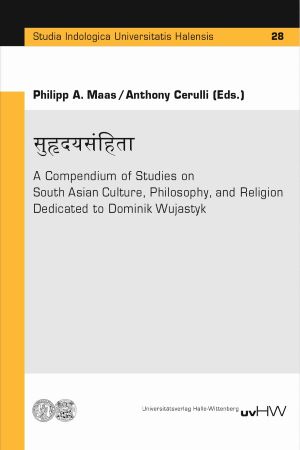Studia Indologica Universitatis Halensis
Die Serie Studia Indologica Universitatis Halensis wird seit 2011 von Walter Slaje unter Mitwirkung von Katrin Einicke und Andreas Pohlus, seit 2022 von Petra Kieffer-Pülz und Andreas Pohlus unter Mitwirkung von Katrin Einicke (bis 2023) herausgegeben. Schwerpunkt dieser im Wesentlichen kulturhistorisch ausgerichteten Monographienreihe ist die historisch akzentuierte Indienforschung, basierend auf der Analyse von indischen Primärquellen. Dementsprechend ist sie offen für alle geschichtlichen Aspekte des indischen Kulturraums, wie es die Geistes-, Ideen- und Religionsgeschichte, die Schöne Literatur, die einheimischen Wissenschaften sowie die vormoderne Sozial- und politische Geschichte Indiens sind.
##plugins.themes.ubOmpTheme01.alreadyPublished##
Suhṛdayasaṃhitā: A Compendium of Studies on South Asian Culture, Philosophy, and Religion. Dedicated to Dominik Wujastyk
The Suhṛdayasaṃhitā is an edited volume dedicated to Dominik Wujastyk that brings together thirteen studies on South Asian intellectual and cultural history from the beginning of the common era to the present day. The multi-disciplinarity and vitality of the academic fields of Indology and South Asian Studies are on full display from chapter to chapter, as leading scholars ask new questions and propose new methods to explore critical topics in their respective fields, including the relationship of the Gāndhāri and Sanskrit languages, bird divination in Indian and cross-cultural contexts, the world view and ethics of early Ayurveda, line drawings in alchemical Sanskrit manuscripts, cannabis in traditional alchemy (Rasaśāstra), deontic logic and terminological problems in Mīmāṃsā and Dharmaśāstra, the identification of an obscure Yoga work referenced in the commentarial literature of the Mahābhārata, psychological transformation and spiritual liberation in Pātañjala Yoga and Buddhism, Sanskrit editorial techniques and the history of printing, the human genome project and the Mahābhārata’s text genealogy, and, finally, the academic pedagogy of contemporary medical anthropology. The time-tested method of analyzing primary sources in Sanskrit and Middle-Indo-Arian languages within their culture-specific historical contexts is fertilized by neuroscience, psychology, evolutionary biology, and anthropology.
In its thematic and methodological diversity, the festschrift, which concludes with a list of Dominik Wujastyk’s works and three indexes, mirrors the broad range of academic interests and expertise of the scholar it is dedicated to.









